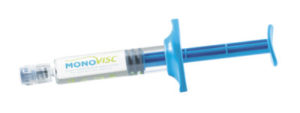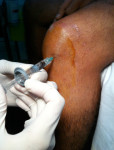Although there is no cure for osteoarthritis of the knee, there are many treatment options available. The primary goals of treatment are to relieve pain and restore function.
In its early stages, arthritis of the knee is treated with nonsurgical methods. Some of the more common options include changes in activity level, pain relievers such as ibuprofen or nonsteroidal anti-inflammatory drugs (NSAIDs), along with physical therapy, and corticosteroid injections.

Another treatment option is a procedure called viscosupplementation. In this procedure, a thick fluid called hyaluronic acid is injected into the knee joint. Hyaluronic acid is a naturally occurring substance found in the synovial (joint) fluid. It acts as a lubricant to enable bones to move smoothly over each other and as a shock absorber for joint loads.
People with osteoarthritis (“wear-and-tear” arthritis) have a lower-than-normal concentration of hyaluronic acid in their joints. Viscosupplementation may be a therapeutic option for individuals with osteoarthritis of the knee. We have also used it in the shoulder, hip and ankle.
Effects of Viscosupplementation
Viscosupplementation has been shown to relieve pain in many patients who have not responded to other nonsurgical methods. The technique was first used in Europe and Asia, and was approved by the U.S. Food and Drug Administration in 1997. Several preparations of hyaluronic acid are now commercially available.
Immediate Effects after Hyaluronic Acid injection
- Hyaluronic acid does not have an immediate pain-relieving effect.
- For the first 48 hours after the shot, you should avoid excessive weightbearing on the leg, such as standing for long periods, jogging or heavy lifting.
- You may notice a local reaction, such as pain, warmth, and slight swelling immediately after the shot. These symptoms generally do not last long. You may want to apply an ice pack to help ease them.
- Very rarely, patients may develop a local allergy-like reaction in the knee. In these cases, the knee may become full of fluid, red, warm, and painful. If this occurs, contact your doctor immediately.
- Infection and bleeding are also very rare complications of this procedure.
Longer Term Effects
- Over the course of the injections, you may notice that you have less pain in your knee. In Dr Lee’s experience, this occurs about 4 weeks after the injection.
- Hyaluronic acid does seem to have anti-inflammatory and pain-relieving properties. The injections may also stimulate the body to produce more of its own hyaluronic acid.
- Effects may last for months to years depending on the individual.

This is a clinic procedure. It takes about 5 minutes to complete and you can walk home after that. Depending on the individual, Dr Lee may choose to do the single shot injection or the 3 shot injection (one injection per week for 3 weeks).
Our knee specialist Dr Lee also uses hyaluronic acid injections after his cartilage repair procedures such as microfracture to improve the results of these procedures. Dr Lee was interviewed about the benefits of Hyaluronic acid injections on Channel News Asia.
Looking For A Reliable Knee Orthopaedic Specialist?
Fast Medical Attention, Transparent Fees
Make an appointment for comprehensive care for your knee problems!
